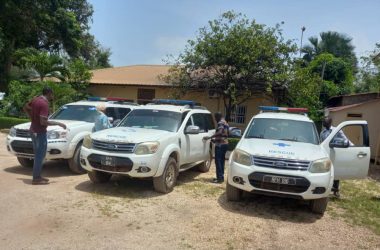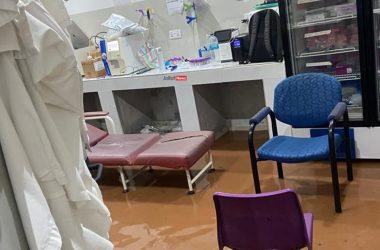
In general, all indications are that we are not yet near the worst of the Coronavirus disease 2019 (Covid-19) and deaths caused by the virus may increase in some parts of the world.
Thus far, there seems to be one report which suggests that the bodies of Covid-19 victims are not contagious – that the virus stops spreading once the host dies. However, that report seems to be irreconcilable with the known resilience of the virus.
The virus is known to stick around the dead body and on a variety of surfaces (e.g., hands, clothes, metal / plastic surfaces, phone, computer, etc. – we are leaning more about this virus) for a long period of time. Thus many public health bodies are of the view that there is a risk of contracting the virus from a Covid-19 victim. Unfortunately there seems to be no or limited restrictions on handling or washing the bodies (Ghusl) of patients who died from Covid–19.
Depending on beliefs and so on, a variety of rituals are done to the dead body before burial. Therefore, appropriate infection control measures must be adopted for Covid-19 victims to reduce the spread of the virus in the community / country. Funeral workers and those involved in washing/preparing the dead body must wear personal protective equipment (PPE) as per the guidelines issued by recognised public health bodies in the country.
The National Burial Council (UK) has issued detailed guidance based on the latest information from public health bodies and the Department of Health (UK) on what to do following death from Covid-19. These precautions (reproduced below) should be adapted by communities and other faiths to the local conditions in the Gambia with a view to controlling the infection of Covid-19 in the community / country.
Precautions on the care of the dead body at the time of death
· [Where possible, the dead body should be classified by the attending physician as category risk.]
· Anyone coming in contact with the dead body must wear protective clothing/PPE such as gloves, water resistant gown / plastic apron over water repellent gown, and surgical mask. It is advisable to use goggles or face shield to protect the eyes, if there is a risk of splashes.
· All tubes, drains, and catheters attached to the dead body should be removed.
· All contacts with members of the family should be kept to a minimum and the bereaved family should wear PPE.
· Overall, there must be minimal contact with the deceased; where possible it should be restricted to individuals under the age of 60 years and in good health.
Precautions on handling the deceased
· The dead body should be first placed in a robust and leak-proof transparent plastic bag of not less than 150μm thick, which should be zippered closed- For those closer to the city of Banjul, this may be sourced from the Ports Authority.
· There will be the need for a second layer of cover. Whenever possible, the bagged body should be either wrapped with a mortuary sheet or placed in an opaque body bag.
· The outside of the body bag should be wiped with 1 in 4 diluted household bleach (– this is done by mixing 1 part of household bleach with 3 parts of water) and allowed to air dry.
Precautions on dead body care in the mortuary
· Where possible, all dead bodies must be identified and correctly labelled with identity labels and category tags.
· Disinfect the trolleys the body is transported in.
[Autopsies may not be a priority at the current time, but if they must be done, special precautions for autopsies must be observed. Covid-19 is an insidious respiratory scourge that has posed very serious challenges to advanced healthcare systems – it is deadly and is able to stick around the body of victims and on surfaces for a long time.]
Precautions on dead body care by funeral workers
· Direct contact with blood or body fluids from the dead body must be avoided. Where applicable, the body must be moved as prepared by the mortuary staff.
· There is need to observe strict personal hygiene and all those coming in contact with the dead body must wear appropriate PPE.
· Where the body is to be stored in the Mosque mortuary the guidance for the mortuary in respect of handling and storing the body must be followed.
· Once the body is transported, wipe down the stretcher and the inside section of the van / vehicle with 1 in 4 diluted household bleach (mixing 1 part of household bleach with 3 parts of water) and allow to air dry.
· Remove PPE after handling of the dead body and wash hands with (liquid) soap and water immediately.
· Do not smoke, drink or eat and do not touch your eyes, mouth or nose.
Preparing the body for funeral – washing the body
· All those who will come in contact with the dead body must observe strict personal hygiene and they must wear appropriate PPE.
· Direct contact with blood or body fluids from the dead body must be avoided.
· It is advisable that all those with wounds must stay away from the dead body.
· Make sure any wounds on the dead body are covered with waterproof bandages or dressings.
· Remove from the plastic bag and dispose bag. Wash the body as normal ritual washing (Ghusl).
Shrouding
· Place the body in a robust and leak-proof transparent plastic bag of not less than 150μm thick, which should be zippered closed.
· Wipe the outside of the body with the diluted household bleach – mixing 1 part of household bleach with 3 parts of water.
· Shroud the body as normal over the body bag.
· Place the body in the coffin / casket and close the lid.
· Wipe the outside of the coffin / casket with the diluted household bleach (mixing 1 part of household bleach with 3 parts of water) and allow to air dry.
Preparing the body for funeral – paying last respects
· Where applicable/possible, viewing can be arranged in the mortuary parlour. Family members will need to wear appropriate PPE – Remember, the number must be kept to a minimum.
· Avoid transporting the body to different locations.
· If viewing is at the Mosque after shrouding, keep the body in the coffin / casket, open the shroud around the face as normal, and viewing through the transparent bag is advisable.
· Once families have paid their respect, re-shroud the face and replace the coffin casket lid.
· Ensure all in contact with the dead body wear PPE.
· Wipe down the coffin / casket with the diluted household bleach before moving for janazah prayer.
· Always remember: Contact with a Covid-19 victim should be kept to a minimum, especially for people aged over 60 with underlying health conditions or anyone with flu-like symptoms should self-isolate and not attend the burial process.
· Wash your hands more often than usual, for 20 seconds using soap and hot water, particularly after coughing, sneezing and blowing your nose, or after being in public areas where other people are doing so. If you have access to a hand sanitiser, use it.
· To reduce the spread of germs when you cough or sneeze, cover your mouth and nose with a tissue and throw it away immediately and responsibly (-in bins). If you do not have a tissue, use your sleeve. Then wash your hands or use a hand sanitising gel if you have one.
Janazah prayer (the Islamic funeral prayer performed in congregation)
· The Janazah prayer can take place as normal; if possible, it should be done at the cemetery.
· Those handling the coffin /casket must wear appropriate PPE.
Burial
· It is advisable to keep the number of people handling the coffin / casket to a minimum. It is advisable that all those handling the coffin /casket must wear appropriate PPE (mask, gown, gloves and eye shield).
· Undertake the burial as normal, but it is recommended to bury in a body bag / coffin.
· Burying in a shroud should not pose any additional infection risk as long as those in contact with the body wear appropriate PPE.
Finally, if you think you have come in contact with high risk surfaces/contacts, you could adopt the following precautions: do not smoke, eat, touch your eyes, mouth, nose, phone , and computer. Consider your next activities (social interactions, including mode of travel).
Whenever possible, change your clothes and wash them; thoroughly wash your hands with soap immediately or have a shower. Such individuals should continue to take the necessary steps to protect self and others and if they show symptoms of the disease, they should self-isolate to stop the spread of the disease.
In brief, we should all work to protect ourselves, and stop the spread of the virus as well as shield certain individuals from Covid-19. If you are worried about Covid-19, click here where you will find a lot of very useful links to help you cope during this uncertain / unprecedented time.
It is the responsibility of all of us to demonstrably look after not only our own health and well-being, but the health and well-being of those around us – this means that we must seriously take note of the advice of recognised public health bodies.





It’s important to note the following:
1. We are dealing with a pandemic.
2. This is a NOVEL virus.
3. We do not know a lot about it.
4. We know it kills.
5. We know it spreads fast.
6. We know there are at least 8 subtypes.
Funeral Rights for Muslims:
The goal is to pray and give last respect to our loved ones without spreading this disease. The Quran is very explicit in its guidance about the responsibility of ALL Muslims in understanding and limiting the spread of contagion.
1. Body should be picked up following the guidance of local public health personnel.
2. The body should NOT be tampered with in anyway
3. Ghusl should NOT be performed
4. Burial should be done in a deep grave at least 8 ft deep
5. All prayers should be postponed to a later date.
God Bless The Gambia